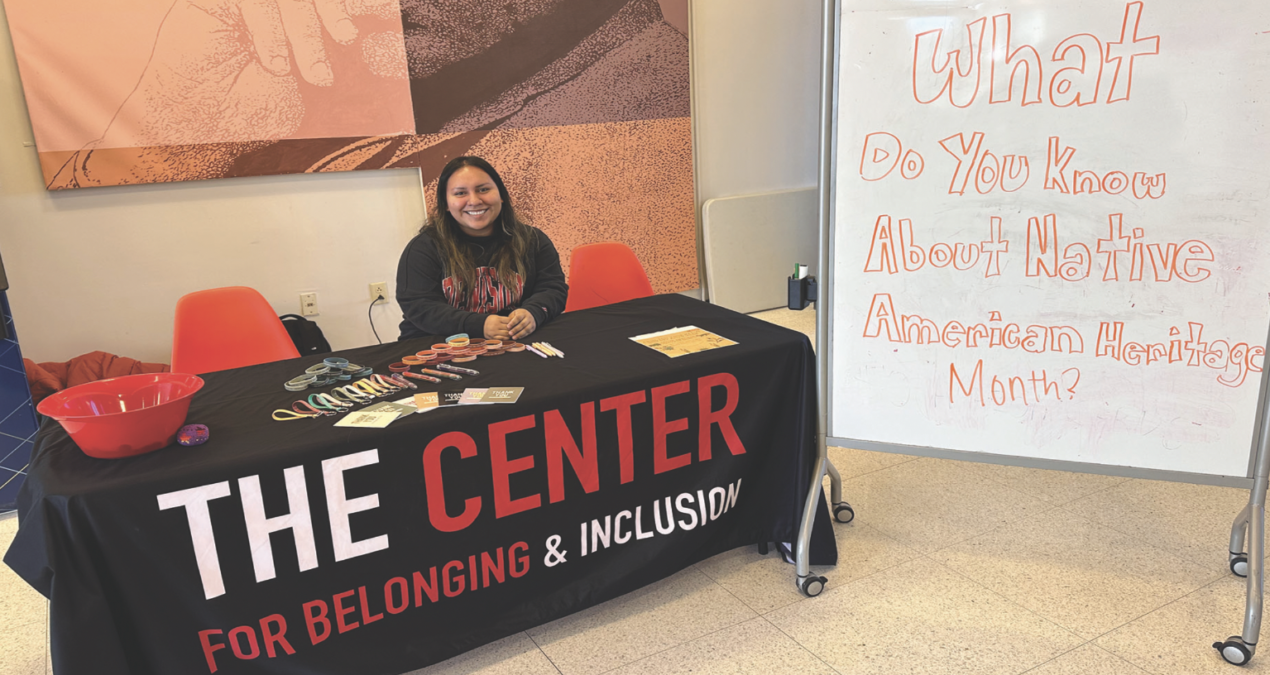AJ Hartwick, Features Editor—
In 1990, President George H. W. Bush declared the month of November as National American Indian Heritage Month. On November 1, the Center of Belonging and Inclusion tabled in Slayter in to kick off Denison’s month-long observation of Indigenous American history.
The mission of the center is to acknowledge and celebrate the rich histories and traditions of historically marginalized and underrepresented groups, and to synthesize a series of programming that promotes the visibility and contributions of these groups on Denison’s campus. For Native American Heritage Month, this includes the kickoff event that took place in Slayter, as well as a collaborative, educational luncheon and a student-faculty networking event.
According to the center’s Program Coordinator Leah Argyle, there are no Indigenous American faculty or staff, and only three students who identify as Indigenous American. Thus, the programming for this month aims to support Denison’s Indigenous American students while also fostering educational, community-oriented spaces.
The next event is slated to take place on November 13, and will be co-hosted by the men of Phi Beta Sigma Fraternity Inc. The luncheon will serve traditional Indigenous American cuisine prepared by the Native American Indian Center of Central Ohio and incorporate educational material in hopes of facilitating an interactive environment for students to engage with and learn from Indigenous Americans.
The last event planned for this month will give students and faculty the opportunity to connect on the basis of Indigenous American culture and identity. This event will be the most tailored to Denison’s Indigenous American students, and follows a format the Center has successfully utilized for other cultural heritage celebrations.
While the Denison community celebrates Indigenous American heritage on The Hill, students and community members are working to uplift the rich history of Licking County’s Indigenous communities. Amelia Morris ‘25 is part of an environmental studies practicum which exposes students to Licking County’s Indigenous history, including Ohio’s only UNESCO World Heritage Site, the Hopewell Ceremonial Earthworks.
“Learning about Ohio’s incredibly preserved indigenous sites and history has changed the way I think about the state, and it’s also made me start to conceptualize the ‘early history’ of Ohio in a completely different way,” said Morris.
According to Granville Township’s website, the earliest people to populate the area we now refer to as Licking County arrived sometime from 100-500 A.D. To add some perspective, European settlers established Granville in 1805, roughly one thousand years later.
Despite Licking County’s historical significance as a home to internationally recognized indigenous sites, Denison offers relatively few opportunities for students to engage with Indigenous American culture and history, particularly in an academic setting.
Many of Denison’s peer institutions, ranging from small liberal arts schools to large public universities, boast an entire department dedicated to Native American and Indigenous studies. For example, students at Vassar College, a liberal arts institution of comparable size to Denison, have the opportunity to major in Native American studies, which allows them to “critically assess Western colonial discourses, examine the many ways Native peoples have contributed to and shaped North American culture, and analyze and honor the autonomy and sovereignty of Indigenous nations, peoples, and thought,” according to Vassar’s website.
Morris expressed hope that UNESCO’s recent recognition of the Hopewell Mounds as a World Heritage Site will encourage students to seek out more information on Indigenous American history.
“I wish there were more opportunities for students to engage with this history and these sites across different majors and departments. This history is incredibly significant to our state and to Granville, and right now only a few students are being exposed to it. Hopefully UNESCO recognizing the Hopewell Mounds will be a start.”

